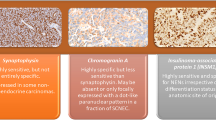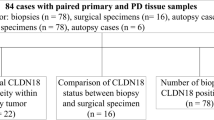Abstract
To investigate the expression and biological significance of Leptin, Leptin receptor, Vascular Endothelial Growth Factor (VEGF), and CD34 protein in colorectal carcinoma tissues. The expression of Leptin, Leptin receptor, VEGF, and CD34 was detected in 68 cases of colorectal carcinoma tissues, paired para-carcinoma tissues and normal colorectal tissues by Immunohistochemical SP Method. The results and related clinicopathological data were analyzed. The positive rate of Leptin, Leptin receptor, and VEGF was significantly higher in colorectal carcinoma tissues than that in paired para-carcinoma tissues and normal colorectal tissues. The expression of Leptin, Leptin receptor, and VEGF was correlated with grade of tumor differentiation, depth of bowel wall invasion, lymph node metastasis, Dukes stage, distant metastasis, and lympho/vascular tumor embolization. Microvessel density (MVD) value in colorectal carcinoma was significantly higher than that in para-carcinoma tissues and normal colorectal tissues, and the density in para-carcinoma tissues was higher than that in normal colorectal tissues. The expression of Leptin, Leptin receptor, VEGF, and MVD value in colorectal carcinoma was positively correlated. In conclusion, microvessel density value is an important index of the growth, invasion, and metastasis of colorectal carcinoma. The binding of Leptin and Leptin receptor promotes the proliferation of colorectal carcinoma cells. The synergy between Leptin and VEGF accelerates the angiogenesis in colorectal carcinoma and accelerates the invasion and metastasis of the tumor cells.
Similar content being viewed by others
References
Weidner, N., Folkman, J., Pzza, F., Bevilacqua, P., Allred, E. N., Moore, D. H., et al. (1992). Tumor angiogensis: A new significant and independent prognostic indicator in early-stage breast carcinoma. Journal of the National Cancer Institute, 84(24), 1875–1887. 1992.
Calle, E. E., Rodriguez, C., Walker-Thurmond, K., & Thun, M. J. (2003). Overweight, obesity, and mortality from cancer in a prospectively studied cohort of US adults. New England Journal of Medicine, 348(17), 1625–1638. 2003.
Attoub, S., Noe, V., Pirola, L., Bruyneel, E., Chastre, E., Mareel, M., et al. (2000). Leptin promotes invasiveness of kidney and colonic epithelial cells via phosphoinositide 3-kinase-, rho-, and rac-dependent signaling pathways. The FASEB Journal, 14(14), 2329–2338. 2000.
Ribatti, D., Belloni, A. S., Nico, B., Di Comite, M., Crivellato, E., & Vacca, A. (2008). Leptin–Leptin receptor are involved in angiogenesis in human hepatocellular carcinoma. Peptides, 29(9), 1596–1602. 2008.
Polak, J., Klimcakova, E., Moro, C., Viguerie, N., Berlan, M., Hejnova, J., et al. (2006). Effect of aerobic training on plasma levels and subcutaneous abdominal adipose tissue gene expression of adiponectin, leptin, interleukin 6, and tumor necrosis factor alpha in obese women. Metabolism, 55(10), 1375–1381. 2006.
Bogusiewicz, M., Semczuk, A., Gogacz, M., Skomra, D., Jakowicki, J. A., & Rechberger, T. (2006). Lack of correlation between leptin receptor expression and PI3-K/Akt signaling pathway proteins immunostaining in endometrioid-type endometrial carcinomas. Cancer Letters, 238(1), 61–68.
Tartaglia, L. A. (1997). The leptin receptor. The Journal of Biological Chemistry, 272(10), 6093–6096. 2006.
Horiguchi, A., Sumitomo, M., Asakuma, J., Asano, T., Zheng, R., Asano, T., et al. (2006). Increased serum leptin levels and over expression of leptin receptors are associated with the invasion and progression of renal cell carcinoma. Journal of Urology, 176, 1631–1635. 2006.
Ferrara, N., & Henzel, W. J. (1989). Pituitary follicular cells secrete a novel heparin-binding growth factor specific for vascular endothelial cells. Biochemical and Biophysical Research Communications, 161(2), 851–858. 1989.
Ferrara, N., & Davis-Smyth, T. (1997). The biology of vascular endothelial growth factor. Endocrine Reviews, 18(1), 4–25. 1997.
Yan, Z., & Xiong, Z. (2007). Expression of leptin receptor and its role in angiogenesis in colorectal cancer. Chinese Journal of Clinical Oncology, 34(3), 140–144.
Wang, C., Deng, Y., Liu, Y., & Gao, M. (2008). Expression and clinical significance of nm23, VEGF-C and VEGFR-3 in colorectal carcinoma. Chinese Journal of Clinical Oncology, 35(19), 1117–1121. 2008.
Zhang, Y., & Che, W. (2008). Recent advances in our understanding of angiogenesis and tumor dormancy. Chinese Journal of Clinical Oncology, 35(5), 293–296. 2008.
Author information
Authors and Affiliations
Corresponding author
Rights and permissions
About this article
Cite this article
Hui, L., Desen, W., Zhizhong, P. et al. Expression and Biological Significance of Leptin, Leptin Receptor, VEGF, and CD34 in Colorectal Carcinoma. Cell Biochem Biophys 60, 241–244 (2011). https://doi.org/10.1007/s12013-010-9145-5
Published:
Issue Date:
DOI: https://doi.org/10.1007/s12013-010-9145-5




